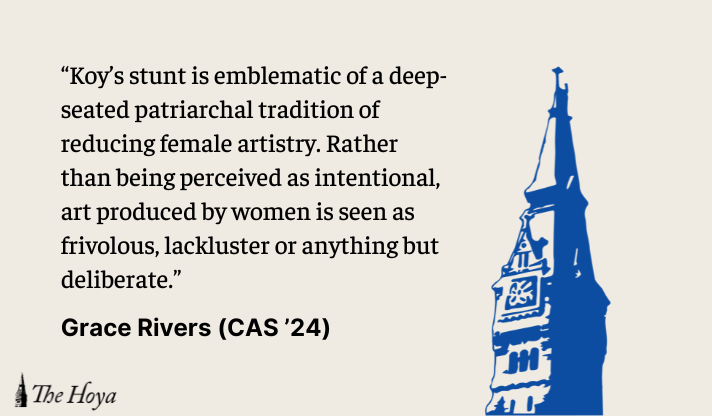At the 81st Golden Globes, stand-up comedian and host Jo Koy delivered a contentious, unamusing and rather sexist monologue about Greta Gerwig’s feminist feature film, “Barbie,” a box office favorite released on July 21, 2023, which was nominated for nine total awards. Koy’s infamous joke, which amassed little more than pitiful, uncomfortable laughs, reduced Barbie to a doll renowned merely for her breasts, and ironically underscored the very message Gerwig’s film purports.
Koy’s stunt is emblematic of a deep-seated patriarchal tradition of reducing female artistry. Rather than being perceived as intentional, art produced by women is seen as frivolous, lackluster or anything but deliberate. Thus, as Georgetown University students and emerging scholars, it is imperative we reform the narrative on women’s artistry and forge new viewing practices that credit female artists for their ingenuity.
During the introduction of the awards show, Koy compared the film inspired by Mattel’s dolls to another film with multiple nominations, “Oppenheimer,” which was also released on July 21 this past summer. Koy jokes, “Oppenheimer is based on a 721-page Pulitzer Prize-winning book about the Manhattan Project, and Barbie is on a plastic doll with big boobies.” Not only did Koy’s commentary exalt male producer Christopher Nolan for his “Oppenheimer”, but it also demeaned the mastery of Greta Gerwig, one of the most celebrated female directors in Hollywood renowned for her work on previous films “Lady Bird” and “Little Women”.
Far from merely a sexualized Mattel toy, for many women Barbie represents the epitome of womanhood: she is acutely aware of her cellulite and flat feet, relies immensely on the intimate bonds of female friendship, resists the patriarchal rule that infiltrates Barbieland and even schedules her first gynecologist appointment. Yet, Koy’s commentary flattens Barbie into a singularly sexual being, a phenomenon the film actively resists.
Koy’s bit is archetypal of a general trend of disparaging art produced by women for women. Much like Greta Gerwig’s “Barbie,” Taylor Swift’s music has been trivialized on account of its emphasis on romantic relationships. To paint Taylor Swift as simply a heartbroken girl, when in reality, she is a masterful lyricist and businesswoman, does her — and us — a disservice.
Indeed, Swift has often fallen victim to claims that her music solely centers her frivolous romantic pursuits, an accusation that seems to be exclusively reserved for female artists. In 2014 on Australia’s 2Day FM radio, Swift explicitly addressed recurrent rumors that she only writes about her ex-boyfriends. The then 24-year-old artist pointed out the double standard for female and male artists in the industry, powerfully stating, “No one says that about Ed Sheeran. No one says that about Bruno Mars. They’re all writing songs about their exes, their current girlfriends, their love life, and no one raises the red flag there.”
In 2023 alone, Swift increased her net worth to over a billion dollars, commenced her Eras Tour, which is set to become the highest-grossing tour of all time, released a concert film of the tour and re-recorded both her “Speak Now” and “1989” albums. Despite the sheer brilliance that has earned Swift such significant success, her art and ingenuity are misogynistically belittled as too male-centric, again a testament to the trivialization of female art.
Recent discourse over the term “chick flick” as a movie genre is another example of how art created for women is not taken seriously. Incredibly influential movies that attract predominantly female audiences, like “Mean Girls,” have received the title “chick flick” as a way of diminishing the film’s mastery and credibility. In essence, it suggests these films are frivolous and trivial merely because they are often produced by women for women. In this way, the term “chick flick” has almost become a derogatory shorthand for female-centric media.
As Georgetown students, we comprise the next generation of burgeoning scholars, which confers an immense responsibility: reforming this narrative. We are active participants in the classroom and the world, and thus, are presented with the opportunity to forge new perceptions of female mastery, perceptions that actively celebrate women’s artful brilliance.
Grace Rivers is a senior in the College of Arts & Sciences.














